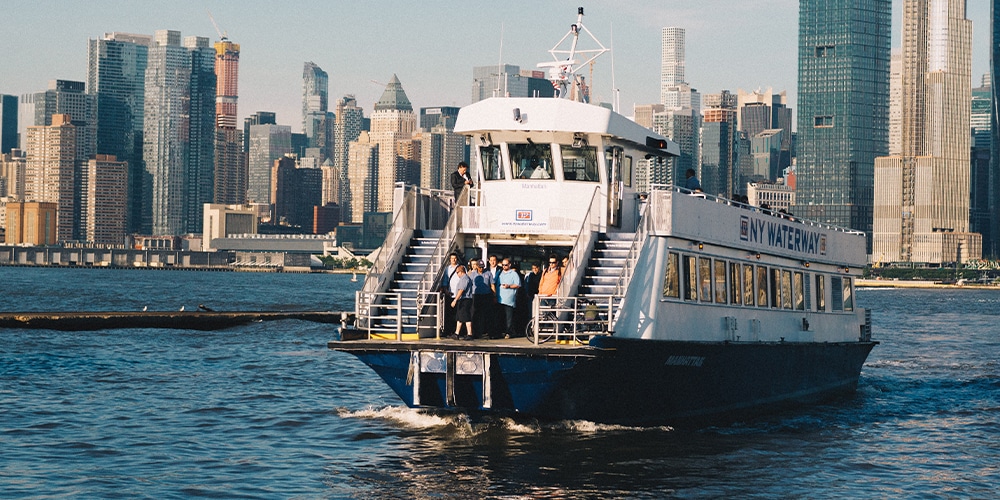It is important that those working in the industry deeply understand travel as a concept. This means being equipped with a basic travel meaning or definition, as well as an understanding of the history of travel. In this article, you can obtain this information and access an overview of the different types of travel.
Table of Contents:
- Travel Meaning: A Working Travel Definition
- A Brief History of the Travel Industry
- The Meaning of Different Travel Modes in the Industry
- Travel Technology and Its Meaning to Travel Innovation
- Meaning of Travel Agents for the Industry
- Travel Management Meaning and Benefits
- Understanding Destination Management
Travel Meaning: A Working Travel Definition
First, it is crucial to explore travel meaning further, which means looking at the definition of travel. Simply put, ‘travel’ refers to the movement of people between distant geographical locations. Travel can occur for many reasons, including relaxation and rejuvenation, exploration, business, and visiting other people.
Travel may take place within one country or may involve movement between countries. In modern times, it has become common for travelers to take a holiday or vacation, which will often involve traveling to another part of the world, visiting sites of significance, taking in local culture, and enjoying local entertainment.
Modern usage of the word travel is believed to date back to the 14th century, although its true origins date back even further. Today, travel can be achieved by walking from one place to another or using vehicles, including cars, trains, taxis, and aircraft. The popularity of travel has also given rise to the modern travel industry.
A Brief History of the Travel Industry
The history of the travel industry can be traced back to ancient times, meaning travel has existed for thousands of years. The Ancient Greek and Roman civilizations, in particular, had wealthier individuals who would travel between different locations for pleasure, much the same way people do today.
That said, most early travel was motivated by trade and the movement of groups of people from one place to another for the longer term. Other examples of travel were motivated by exploration and the discovery of new islands, such as the voyage that led to Christopher Columbus reaching America for the first time.
Early forms of travel were often arduous and much more dangerous than travel today, which has been significantly helped by advances in technology and the development of vehicles. For instance, the development of air travel has had a major influence on the modern travel industry, allowing customers to travel between countries exceptionally quickly.
The Meaning of Different Travel Modes in the Industry
In the sections below, you can expand your knowledge of travel meaning by exploring the numerous types of transportation services available, and what they each have to offer customers.
Car Travel Meaning
Car travel, meaning traveling with automobiles, has helped change the dynamics of moving between locations, making travel available to more people. Through the use of cars, individuals and families can use their own vehicles, select their preferred route, plan stops along the way, and make changes to that plan in the heat of the moment.
Aside from this use of personal vehicles, one of the most significant travel trends of recent times has been the rise of car rental services. These services allow travelers to access a car once they arrive in a new location, and this can be especially beneficial for overseas trips, providing swift travel to the location through other means while still offering the freedom associated with road-based travel once a traveler has arrived at their destination.
Even more recently, car rental services have started offering mobile apps, allowing visitors to easily access a car, no matter where they are in the world. This has been especially beneficial for corporate travelers. All forms of car travel ultimately allow groups of people to go on road trips.
Bus Travel Meaning
Bus services have been a major component of the industry for many decades, with the predictability of bus travel meaning customers can easily plan their journey. Most bus services operate according to a regular timetable, and services tend to run on the same days and at the exact times. That said, peak times may result in more active bus services to accommodate the additional demand.
Although buses are often used to travel around cities, they are also a reliable and affordable option for those looking to travel greater distances for domestic or international travel.
Like many other modes of transport, bus travel has been boosted by the availability of information smartphones offer. The creation of apps has also made it easier for travelers to book tickets and secure a seat. Meanwhile, technological advances have helped make modern buses more sustainable and cheaper to operate.
Rail Travel Meaning
Rail travel refers to using railways and trains to move from one location to another. Rail travel is popular because it tends to be faster than a car and bus travel while providing the predictability of the latter due to the use of set timetables and established routes, which usually ensure that trains pass by multiple stations.
In recent times, sustainable travel meaning has been a significant focus for some consumers, and it is also emerging as one of the major travel marketing trends. The use of railways is often highlighted as one of the ways that everyday travelers can reduce carbon emissions, especially when using cars, buses, and planes.
Some rail routes have been intentionally designed to be as scenic as possible, meaning travel by train can provide enjoyment. This is especially apparent with routes like the Trans-Siberian Railway, the longest railway line in the world, or specific trains that serve as tourism products, such as the historic Orient Express.
Air Travel Meaning
Air travel services are provided by companies operating in the airline industry. These companies, collectively known as airlines, provide customers with air transportation services, primarily using jets or similar airplanes.
Passengers can purchase seats on flights that are traveling to their chosen destination. These flights are the fastest method of transport available to the public, meaning air travel is the standard mode of transportation for most journeys to far-off locations. However, many airlines do also operate domestically.
In the article “Airline Industry: All You Need to Know About The Airline Sector”, you will find more information about air travel and airlines, including the different types of airlines and their central business models.
Water Travel Meaning
A basic water travel meaning or definition would be travel that takes place using a boat, ship, or similar waterborne mode of transport. The history of water travel dates back thousands of years, and until the invention of aircraft, it was the primary way for people to travel to overseas locations.
Water transport is still widely utilized today, especially for short crossings. In many cases, ferry and boat services are more affordable than the main alternatives.
On top of this, it is also important to note that water transport can be an enjoyable part of a holiday. For instance, some people enjoy short river cruises while staying in a location. In contrast, others travel longer distances on recreational cruises, where they sleep, eat, and enjoy entertainment on the boat over several days.
Water Travel Meaning: Ferry
Travel Technology and Its Meaning to Travel Innovation
Travel technology can enhance the customer experience in several exciting ways. For example, mobile apps have dramatically improved access to travel products because customers can make bookings at any time, regardless of where they are, including making last-minute or spur-of-the-moment purchases.
Of course, travel technology can also potentially improve business operations. For instance, within hotels, using artificial intelligence and the Internet of Things can help automate processes, reducing demands placed upon staff. Meanwhile, virtual reality can help travel companies sell their products in the first place.
In the article “11 Key Technology Trends Emerging in the Travel & Tourism Industry”, you will find out about some of the most significant technology and travel trends disrupting the industry today.
Meaning of Travel Agents for the Industry
Many customers looking to travel to a different location will find and book specific travel products through a travel agent. Travel agencies offer a comprehensive service, selling products on behalf of travel companies and offering expert advice. Generally, they will receive a commission fee for each successful sale.
Business leaders, marketers, and others involved in travel management may turn to travel agents to help them sell their products and services, which expands the range of potential customers travel companies can reach. Typical products and services sold by travel agents include hotel rooms, flights, car rentals, and tours.
In the article “10 Travel Agents for Hotels to Gain More Corporate & Leisure Guests”, you can learn more about the value and meaning of travel agents, while also accessing a list of some of the main travel agencies to turn to.
Video: Travel Meaning: Tour Operators, Travel Agencies, and Consolidators
Travel Management Meaning and Benefits
Aside from being equipped with a travel definition, it is essential to understand the concept of travel management. As a discipline, travel management is concerned with organizing corporate travel and optimizing expenditures so businesses can get real value for their money.
In the article “What is Travel Management?” you can access a complete breakdown of what travel management is, why it is useful, how it relates to the concept of a travel agent and much more.
Understanding Destination Management
Destinations have the potential to benefit enormously from new visitors, with a high number of travelers meaning more money is spent in the local economy, and more opportunities are on offer for local businesses. Destination management is coordinating and holistically managing tourism for a location, minimizing negative consequences, and maximizing the plus points associated with the travel industry.
In “Destination Management: How Tourism Adds Value to Your Destination”, you can explore the discipline of destination management further and understand how a destination management strategy can be implemented.
Understanding the meaning of travel is important for anyone in any part of the travel industry. With that being said, it is also essential to understand the different modes of transport, the history of the industry, and some of the ways that technology is helping to revolutionize the modern travel experience.
More Tips to Grow Your Business
Revfine.com is the leading knowledge platform for the hospitality and travel industry. Professionals use our insights, strategies, and actionable tips to get inspired, optimize revenue, innovate processes, and improve customer experience.Explore expert advice on management, marketing, revenue management, operations, software, and technology in our dedicated Hotel, Hospitality, and Travel & Tourism categories.
This article is written by:
Hi, I am Martijn Barten, founder of Revfine.com. With 20 years of experience in the hospitality industry, I specialize in optimizing revenue by combining revenue management with marketing strategies. I have successfully developed, implemented, and managed revenue management and marketing strategies for individual properties and multi-property portfolios.










Leave A Comment